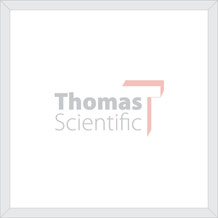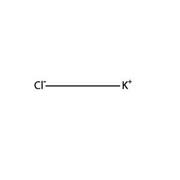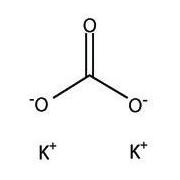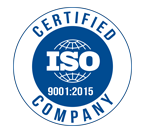bioWORLD, 12350000, Reagents, 1 kg
-
A polymer used to precipitate proteins, viruses, DNA and RNA. Compound is hydroscopic.s Appearance: Solid Density: 1.21 g/cm3 at 20°C pH Value: 5-7 RTECS Number: TQ4025000
-
bioPLUS™ Sodium Chloride
bioWORLDSodium Chloride is arguably the most essential salt in molecular biology and cell culture. It is a common ingredient in cell culture media, lysis buffers, and protein storage. Molecular Biology Grade Sodium Chloride is of >99% purity and has been thoroughly tested for chemical impurities. It is…
-
Potassium Chloride
bioWORLDA common laboratory reagent and standard Specifications ACS Grade Iodide: <0.002% Bromide: <0.01% Chlorate and Nitrate: <0.003% Nitrogen compounds: <0.001% Phosphate: <0.0005% Sulfate: <0.001% Barium: <0.001% …
-
This is a common chemical reagent used in buffer solutions. Application: For Research and Laboratory use only
-
Potassium hydroxide
bioWORLDBuffer reagent Used for making potassium soap, shampoo, potassium permanganate etc. Used in dye, drugs manufacture, galvanization, carving, lithography etc. A basic reagent used for alkaline lysis and pH purposes. Specifications Reagent Grade Moisture: 10-15% …
-
Potassium Carbonate, anhydrous
bioWORLDSynonyms: Carbonate of potash; Dipotassium carbonate; Dipotassium salt; Pearl ash; Potash; Salt of tartar; Salt of wormwood A potassium salt for deproteinization and as a drying agent Common biochemical reagent used in soap, glass, and china production and as a drying agent and…
-
Agarose 1, Biotech Grade
bioWORLDbioPlus Agarose I is formulated specifically for analysis of nucleic acids, using standard electrophoretic techniques. Biotechnology Grade Gel strength: >1200g/cm2 Gelling point: 33-39°C Melting point: 87-89YC Sulfate EEO(-mr) DNase, RNase, Protease activity: None detected …
-
bioPLUS™ Sucrose, Ultra Pure Grade
bioWORLDSucrose is a disaccharide related to Glucose and Fructose. It is most commonly used in biotechnology as a carbohydrate source in plant tissue culture media. Sucrose has been observed to significantly improve root and shoot growth. Ultra Pure Grade Sucrose is DNase and RNase free. It is a popular…
-
Sodium Alginate
bioWORLDSodium Alginate, or Alginic Acid Sodium Salt, is a natural amylose carbohydrate distilled from algae. It is used in biotechnology as an effective stabilizer and emulsifier. In the presence of Calcium ions, Sodium Alginate has been observed to form cross-linked gels for cell immobilization. Plant…
-
The bioWORLD bioPLUS™ anhydrous potassium phosphate dibasic is suitable for use in molecular biology experiments and plant tissue culture technique. Application: For Research & Laboratory Use Only
-
bioPLUS™ Urea
bioWORLDUrea is an organic compound with two amine groups joined by a carbonyl functional group. It serves an important role in the metabolism of nitrogen-containing compounds and makes an excellent Nitrogen-source in plant fertilizer. Urea is often used in protein denaturation and tissue fixation. Unlike…
-
Sodium Acetate Anhydrous is used for precipitation of nucleic acids and preparation of gel stains for protein gel electrophoresis. Sodium Acetate Anhydrous can serve as a reagent with many uses including nucleic acid precipitation in isolation protocols and for use in buffers. Application: For…
-
bioPLUS™ Polyvinylpyrrolidone 40000
bioWORLDPolyvinylpyrrolidone 40,000, or better known as PVP, is a solubilizing polymer. It is an effective lubricant and protein stabilizer. PVP has been used to remove alkaloids and phenolics from plant tissue samples to improve mass spectrometry results. Polyvinylpyrrolidone is generally used at 2-4%…
-
Magnesium Sulfate, heptahydrate
bioWORLDA preparation of magnesium sulfate Synonym: Epsom salt ACS Grade Chloride: <0.0005% Nitrate: <0.002% Ammonium: <0.002% Calcium: <0.02% Heavy metals (as Pb): <0.0005% Iron: <0.0005% Manganese: <0.0005% Potassium: <0.005% …
-
bioPLUS™ Sodium Metabisulfite
bioWORLDAn antioxidant reducing agent, with antimicrobial and antifungal properties. Application: For Research and Laboratory use only
-
Urea
bioWORLDUsed for protein denaturation protocols and is a reagent for PAGE protocols. Ultra Pure Grade A280 (5M, water): Melting Range: 132-135°C Chloride: Heavy Metals (as PB): Iron: Cyanate: None detected Ammonia: None detected
-
bioPLUS™ Pyruvic Acid Sodium Salt
bioWORLDAn intermediate of sugar metabolism and degradation. Used as an additive to culture media (cellular). Has protective effects against Hydrogen Peroxide and also provides extra energy. Application: For Research & Laboratory Use Only
-
D-Glucose, monohydrate
bioWORLDBiotechnology Grade Purity (anhydrous): >99.5 Specific rotation: +53.6 to +53.2° Insolubles: Residue after Ignition: Chloride: Sulfate and Sulfite: Heavy Metals (as Pb): Iron: Moisture (105°C): 8-9% RNase and DNase, Protease activity: None detected
-
Guanidine hydrochloride
bioWORLDA strong chaotropic agent used at high concentrations for denaturing native proteins and inactivating RNAses. Biotechnology Grade (also available in Proteomics Grade) A260: A230: Lead: Iron: Melting Range: 184-186°C RNase/DNase Activity: None detected
-
D-Glucose, Anhydrous
bioWORLDBiotechnology Grade Specific Rotation: 52.5 to 53.0° Moisture (105°C): Chloride: Sulfate and Sulfite: Arsenic: vHeavy metals (as Pb): Iron: RNAse/Protease Activity: None detected
-
Potassium Acetate
bioWORLDPotassium salt of acetic acid. Used as a deicer instead of chloride salts such as calcium chloride or magnesium chloride. Used as part of replacement protocols in the treatment of diabetic ketoacidosis because of its ability to break down into bicarbonate and help neutralize the acidotic…
-
Potassium Sulfate
bioWORLDThe bioWORLD potassium sulfate containing K nutrition, is mainly used as a fertilizer for various crops. It is also used in pharmaceutical industry. Application: For Research and Laboratory use only
-
bioPLUS™ Sodium Carbonate Anhydrous
bioWORLDSodium Carbonate is a relatively strong base commercially used as washing soda and a water softener. It precipitates Calcium and Magnesium ions from aqueous solutions, making it an effective water softener. Sodium Carbonate is used in the preparation of solutions for gas chromatography and protein…
-
bioPLUS™ Sodium Nitrate
bioWORLDThe bioWORLD bioPLUS™ sodium nitrate is suitable for use in manufacturing explosives and fertilizers. It is also used to cure cyanide poisoning. A water soluble compound that forms hexagonal crystals
-
Magnesium Chloride, hexahydrate
bioWORLDA source of magnesium ion and a co-foactor for many enzyme ACS Grade Nitrate: <0.001% Phosphate: <0.0005% Sulfate: <0.002% Ammonium: <0.002% Sodium: <0.005% Strontium: <0.005% Heavy metals (as Pb): <0.0005% Iron: <0.0005% …
-
The bioWORLD bioPlus™ anhydrous sodium phosphate monobasic is mainly used as a saline laxative. It is also used in manufacturing detergents, soaps and fertilizers. This is used in pharmaceutical industries as well. Application: For Research and Laboratory use only A chemical compound of sodium…
-
Manganese sulfate, monohydrat
bioWORLDA preparation of manganese for investigations Reagent Grade Chloride: <0.01% Heavy metals (as Pb): <0.05% Iron: Trace Zinc: <0.02% Appearance: Pink Crystalline Powder Boiling Point: 850°C Density: 2.95 g/cm3 HS Code: 28332990 …
-
Oxalic Acid Dihydrate, 1 kg
bioWORLDA diprotic reducing agent used as a buffer Synonym: Ethanedioic acid Specifications High Purity Grade Insolubles (H2O): <0.05% Ash: <0.2% Iron: <0.005% Chloride: <0.005% Appearance: Solid Boiling Point: 108-109°C …
-
The bioWORLD bioPlus™ sodium thiosulfate pentahydrate is suitable for use as a intravenous medication for cyanide or metal poisoning. It is used in manufacturing paper, leather and pesticides. It is also used as a dechlorinator for ponds and aquariums. Application: For Laboratory Chemicals,…
-
bioPLUS™ Sodium Bicarbonate
bioWORLDSodium Bicarbonate, more commonly known as baking soda, is a common biological buffer. In small concentrations, it can serve as a fungicide for a number of plant species. Many laboratories keep Sodium Bicarbonate on hand to neutralize acid spills. Sodium Bicarbonate is of Molecular Biology Grade…


















